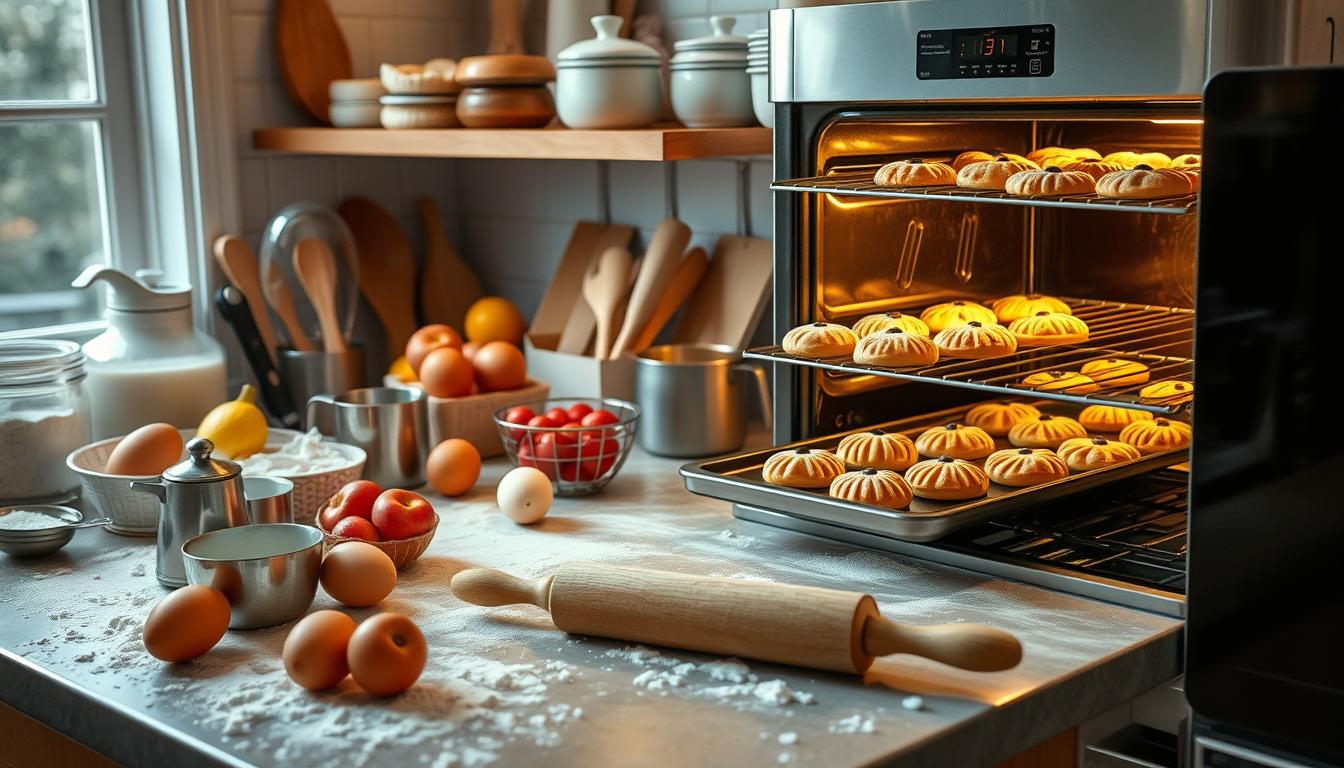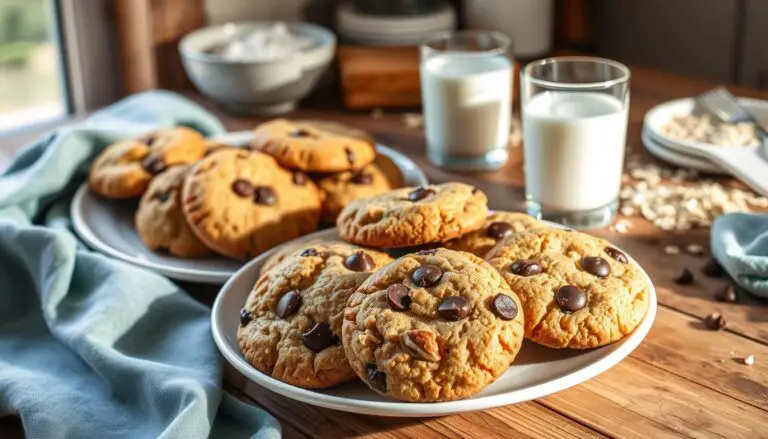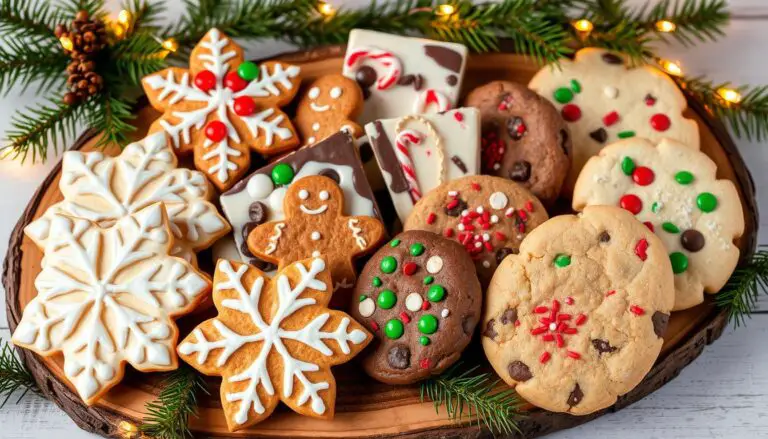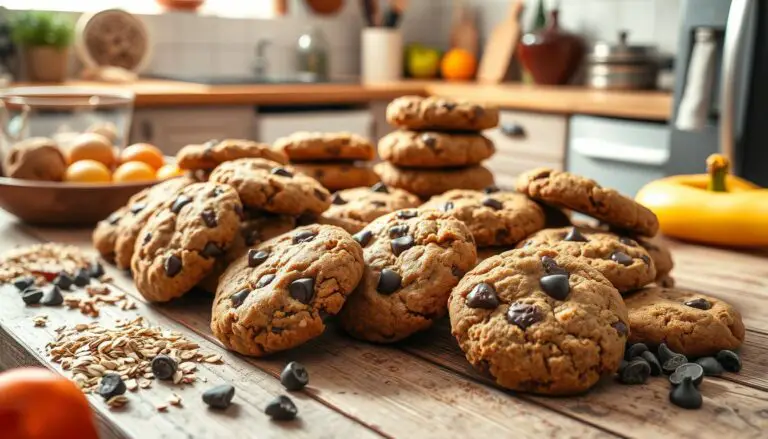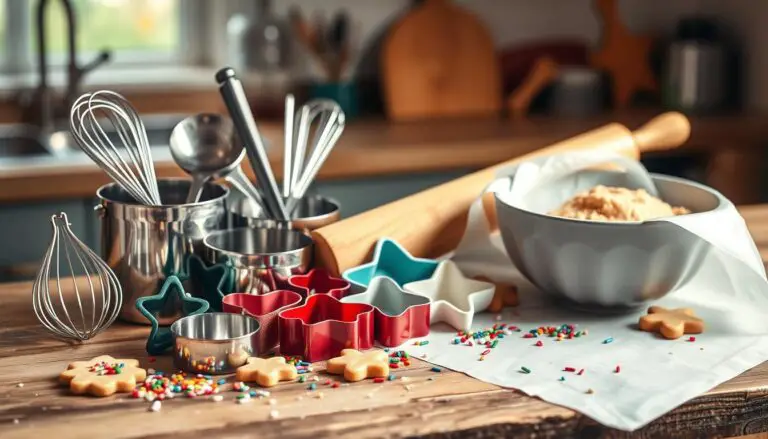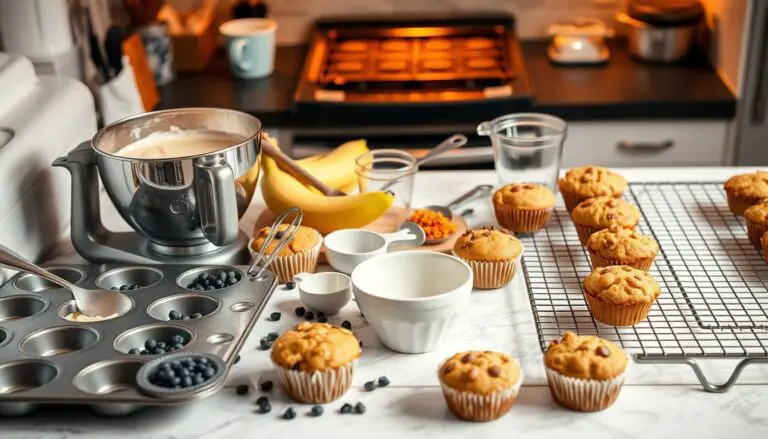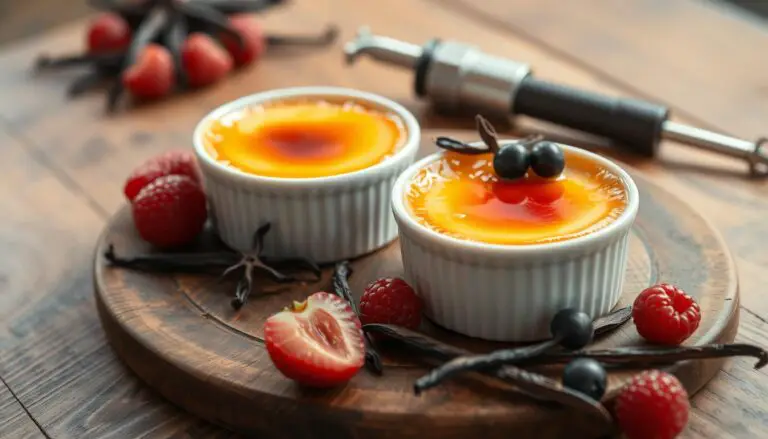Easy Baking Tips: Unlock Your Inner Pastry Chef
Baking is a mix of art and science, needing both skill and creativity. This beginner baking guide offers easy tips to improve your baking at home. It’s great for beginners or those wanting to get better at baking.
Getting precise with ingredients is key; small mistakes can change your baked goods a lot1. Knowing how room temperature ingredients affect your mix can make it smoother and better1. Also, preheating your oven right ensures even cooking, avoiding common mistakes1.
Choosing the right bakeware is also important. It affects how long things bake and their texture1.
Learning to mix ingredients well and when to stop is part of this guide. With these tips, you can make simple treats into tasty masterpieces.
For more tips, check out this article on easy baking hacks.
Key Takeaways
- Mastering measurements is essential; precise ingredients yield consistent results.
- Room temperature ingredients create a smoother batter and improve texture.
- Preheat your oven for even baking results.
- Choose the right bakeware to affect baking times and outcomes.
- Mixing techniques vary; knowing how to mix properly enhances your baked goods.
Understanding the Basics of Baking
Baking is a precise science where knowing the basics is key to making delicious treats. Precision is crucial because small changes in ingredients can greatly affect the outcome. Learning about common baking ingredients and their roles is essential for any baker. For beginners, learning these baking basics is the first step to future culinary adventures.
Importance of Precision in Baking
Getting consistent results means understanding how to measure ingredients accurately. Measuring correctly is especially important in baking, where recipes often use common measurements like cups and tablespoons2. To ensure accurate measurements, use a kitchen scale for dry and liquid ingredients. This ensures each ingredient works well together in the final mix3. Experts recommend reviewing recipes and all ingredients before starting, as this can lead to better results each time2.
Common Ingredients and Their Roles
Knowing common baking ingredients like flour, sugar, and fats is key to following recipes well. Each ingredient has a specific role: flour gives structure, fats add moisture and flavor, and leavening agents help baked goods rise3. Essential beginner supplies include measuring cups, a kitchen scale, and a mixer2. Learning techniques like folding and kneading can also improve the texture and structure of baked goods3.
| Ingredient | Role |
|---|---|
| Flour | Provides structure |
| Butter | Contributes moisture and flavor |
| Sugar | Adds sweetness and moisture |
| Eggs | Acts as a binder and adds richness |
| Leavening Agents | Creates rise and lightness |
Novice bakers often make mistakes, like using the wrong pan, which can cause items to stick2. The more you practice, the better you get and the more confident you become. This shows that improving through practice is essential for successful baking.
Easy Baking Tips for Beginners
Baking is fun for newbies. Start with simple recipes to improve your skills without stress. Cookies and muffins need fewer ingredients and steps, making them great for beginners.
As you get better, you can try more complex recipes.
Starting with Simple Recipes
Simple recipes are a great start for beginners. Each success brings you closer to more challenging desserts. Remember, a cup of flour can vary in weight, affecting your baked goods’ texture and taste45.
Using basic ingredients helps avoid confusion in your baking journey.
Essential Baking Tools to Invest In
Good baking tools make your process smoother and more consistent. A reliable digital scale is key for accurate measurements4. Also, liquid measuring cups should be checked at eye level for accuracy5.
Choosing top brands like King Arthur Flour and Land O’ Lakes Butter ensures the best results. Remember to adjust for high-altitude baking and check your oven’s temperature.
Here’s a quick guide to essential tools for beginners:
| Tool | Purpose | Recommendation |
|---|---|---|
| Digital Scale | Precise measurements | Use for all ingredient types |
| Liquid Measuring Cup | Measure liquids accurately | Check at eye level |
| Mixing Bowls | Combine ingredients | Ensure various sizes for different recipes |
| Spatulas | Mix and scrape batter | Choose silicone for ease of use |
| Baking Sheets | Even heat distribution | Select light-colored metal pans |
By following these tips, beginners can make tasty treats and build a solid baking foundation. Knowing your tools and starting with simple recipes are key to mastering baking45.
Mastering Measurement Techniques
In baking, getting the measurements right is key. It can make all the difference between a tasty treat and a mess. Knowing how to measure accurately is crucial for making delicious baked goods6. If you get it wrong, your treats might not turn out right.
Why Accurate Measurements Matter
Flour is often the ingredient that gets measured wrong. Using the ‘spoon and level’ method helps avoid too much flour. This ensures you get the right amount7. Also, sifting flour before measuring makes it lighter and prevents lumps6.
Tools like measuring cups, spoons, and kitchen scales are important. They help you measure dry ingredients like flour correctly6. For dry ingredients, fluff, scoop gently, and level off excess for exact amounts6. Liquid ingredients need careful measuring too, as small mistakes can change the taste and texture.
Using a Kitchen Scale for Precision
A kitchen scale is great for baking because it measures by weight. This is more accurate than volume. For example, a standard sachet of yeast is about 2 and 1/4 teaspoons7. Dry measuring cups range from 1/4 cup to 1 cup8.
Measuring spoons, like 1 tablespoon and 1 teaspoon, are needed for different amounts8. For liquids, specific measuring cups help avoid spills. Sugar and cocoa powder are measured similarly, using the ‘spoon and level’ method7. Remember to check expiration dates on baking powder, baking soda, and other ingredients to keep them fresh7.
Essential Baking Hacks from Pastry Chefs
Discover the secrets of baking success with tips from pastry chefs. Mastering temperature control can make a big difference in your baking. It’s not just about measuring right; it’s also about the temperature of your ingredients and oven.
The Magic of Temperature Control
Temperature is key to making baked goods look good and taste great. Make sure your oven is preheated to the right temperature. Even a small mistake can change the result a lot. Pastry chefs say using a digital kitchen scale is important for exact ingredient measurements9.
Butter temperature is also important for a flaky pie crust10. Chilling dough helps with texture and prevents cookies from spreading too much9.
Creative Ingredient Substitutions
Substituting ingredients can be helpful when you’re missing something. Many chefs use plain yogurt instead of buttermilk for moisture and tang9. Applesauce can replace eggs, which is great for vegan baking9.
Using vanilla paste instead of vanilla essence can add a richer flavor10. These hacks not only improve your baking but also let you get creative in the kitchen.
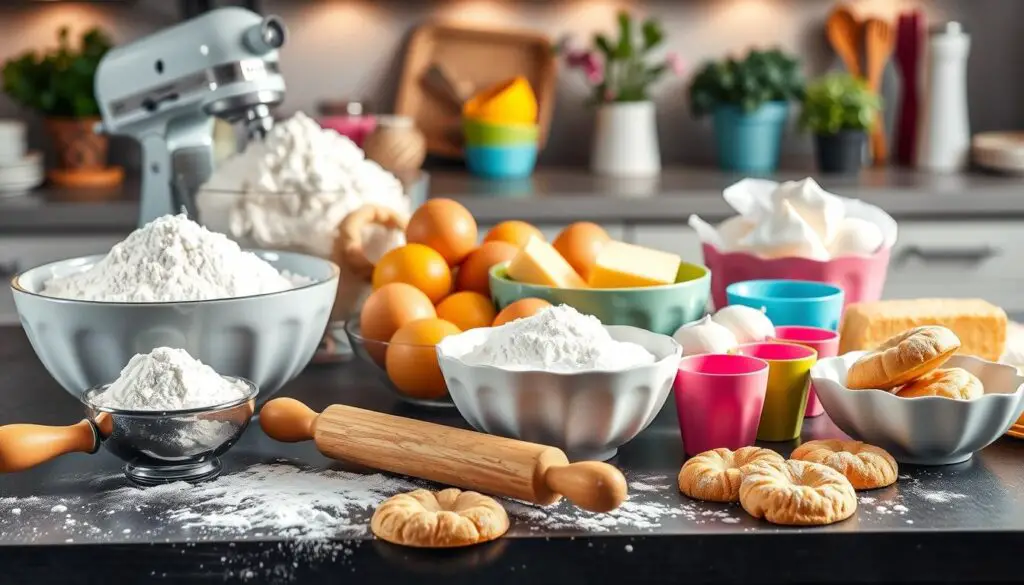
How to Prepare Your Ingredients
Getting your baking ingredients ready right is key to great results. Making sure they’re at room temperature helps a lot. It makes mixing easier and your treats taste better. Follow these tips to improve your baking and make delicious treats every time.
The Benefits of Room Temperature Ingredients
Using ingredients at room temperature can really change your baked goods. Eggs and butter mix better when they’re not cold. This makes your cakes fluffier and your cookies softer. If you’re in a hurry, here are quick ways to warm them up:
- Place your eggs in a bowl of warm water for about five minutes.
- Cut butter into smaller pieces to soften it more quickly.
Tips for Preparing Eggs and Butter
Eggs add structure and moisture to your baked goods. So, it’s important to use fresh eggs at room temperature11. European-style butter, with more fat, makes your treats richer than American butter12. Here’s how to get your eggs and butter ready:
- Make sure your eggs are fresh and at room temperature.
- Use high-quality butter for better taste and results.
| Ingredient | Optimal Temperature | Key Benefits |
|---|---|---|
| Eggs | Room Temperature | Improved mixing, moisture |
| Butter | Room Temperature | Better emulsification, flavor |
Learning how to prepare these basic ingredients is crucial. It helps you make healthier and tastier baked goods. It’s a must-have skill for any baker12.
Easy Baking Tips for Perfect Mixing Techniques
Baking is all about mixing techniques. These techniques affect how your baked goods turn out. Gluten, a protein in flour, is key. It forms when flour meets water, making baked goods have structure.
Getting the right amount of gluten is crucial. Too much gluten makes bread chewy but ruins pastries and cakes. It’s all about the texture you want.
Understanding Gluten Development
Quality ingredients are essential for great-tasting baked goods. Baking well means using the right amounts of everything. This ensures your baked goods are always delicious.
Start with a 75% hydration level for easier dough handling. This helps gluten form better. As you get better, try up to 90% hydration for a lighter crumb in whole grain recipes13.
Don’t Overmix: The Key to Texture
Overmixing makes baked goods tough or dense. This is especially true for recipes that use gluten. Mix just until ingredients are combined for a light texture.
Techniques like folding are great for adding ingredients without too much gluten. They’re perfect for egg whites or whipped cream. Remember, check for doneness by color and toothpick tests14.
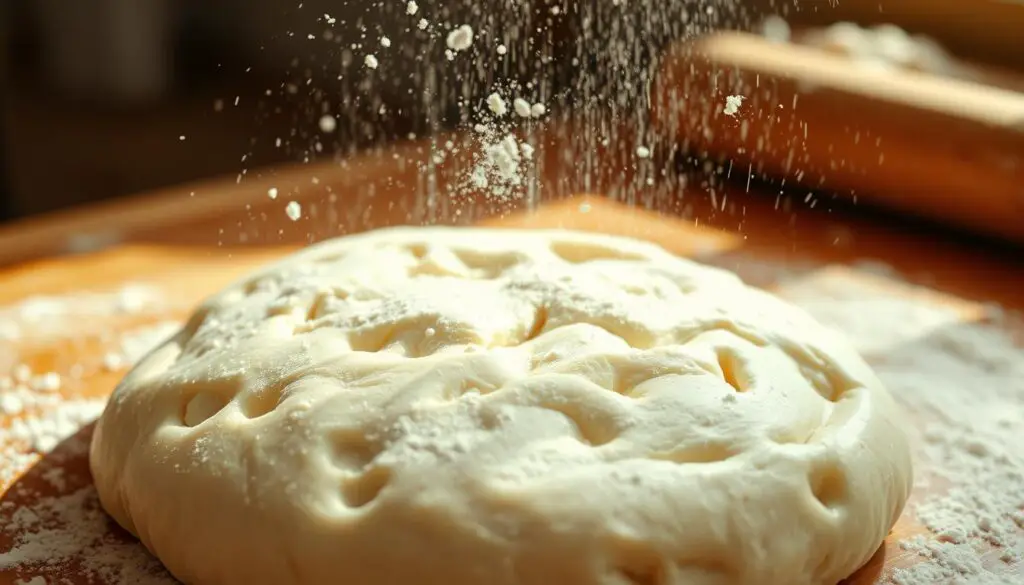
Perfecting Your Baking Environment
Creating the perfect baking environment is key to making delicious treats. Using your oven well and preheating it right are crucial. For beginners, learning how to use your oven can make a big difference. It ensures your baked goods turn out just right every time.
How to Use Your Oven Effectively
To get the most out of your baking, keep the oven door closed while baking. This helps save energy by keeping the heat in. Using an oven thermometer is also helpful. It ensures your oven is at the right temperature, which is important for even baking.
Keeping the temperature consistent is important. It helps the center of your baked goods cook perfectly without the edges getting too hot15.
Tips for Preheating Your Oven
Preheating your oven is a must for good baking. Try to preheat for at least 20 minutes before baking. This helps the heat spread evenly, which is great for baking.
Also, check out preheating tips to improve your baking skills. Using heavy-duty aluminum foil and paper towels can also help control the temperature in your pans16.
Choosing the Right Bakeware
Choosing the right bakeware is key to baking success. Different materials affect how heat spreads and how long things bake. Metals like aluminum absorb heat fast, making them great for even baking without hot spots1718. Glass bakeware also spreads heat well but might not give you the crust you want.
The Impact of Bakeware Material
Aluminum pans are a favorite because they’re light and heat spreads evenly1718. But, non-stick aluminum pans need extra care to keep the coating good. Silicone pans don’t hold heat well and are best for recipes that don’t need baking.
Adjusting Baking Times for Different Pans
Changing bakeware means you might need to adjust baking times. For instance, lighter aluminum pans bake faster than darker ones because of how they hold heat17. Also, using pans that fit your recipe well makes baking easier. An 18-by-13 inch half-sheet pan is very useful, and three 8-inch round pans can prevent spills17.
Learn more about the impactof bakeware on your baking results

